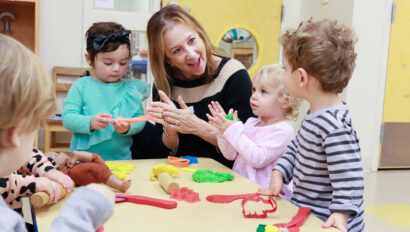7 Ways a Garden Can Grow More Than Vegetables
Growing a vegetable garden has always been a great way to produce your own food and spend time in nature, and it’s becoming even more popular now. Here are 7 beneficial aspects of gardening worth thinking about:
- A Multi-Generational Experience: What makes gardening so wonderful is that almost anyone can do it. It encompasses many different kinds of activities throughout the growing season, which makes meaningful work for people of all ages and abilities. For example, some children find enjoyment and relief in simply rolling their hands in the soil, while others enjoy training climbing plants along trellises. A garden is also a place where people of all ages can come together and share experiences; 3-4 year olds can help their grandparents with their youthfulness and energy, while seniors can teach the children with their wisdom. This “intergenerational” gardening allows young children to learn first-hand the vital teaching from Leviticus (19:32) “You shall rise before the aged and show deference to the old.” Being told to “respect your elders” takes on a whole new meaning when children and seniors collaborate. Regardless of age or ability, gardening offers something meaningful for everyone and affords them the opportunity to work and learn together.
- Accessible To All: Plants grow in all shapes and sizes. Lettuce, for example, grows close to the ground, while sunflowers can grow 7 feet tall; and other vegetables and herbs grow somewhere in between. People who garden often have a similar “range” when it comes to their mobility, reach and physical abilities. Gardens can be designed with this in mind. Garden beds can be set up at different heights and contain nice wide pathways that make them accessible to children, adults, and individuals in wheelchairs. As the Psalmist writes, “How good and how pleasant it is that siblings dwell together” (Psalms 133:1). When we make space for everyone in our garden, our experience is enhanced. Just like the natural world makes a space for everyone to enjoy its wonders, our gardens can be accessible to people of all abilities, making them truly inclusive experiences.
- Self-Fulfillment: Watching a seed sprout into a seedling is quite gratifying for the person who filled that pot with soil, planted the seed ever so meticulously, and watered it daily to ensure it stayed hydrated. Planting that seedling into a larger garden space and watching it develop into a leafy, food-bearing plant is even more deliciously satisfying for the gardener who made it happen. That feeling of accomplishment – seeing your work grow before your very eyes – is phenomenally rewarding. For seniors, who are searching for a renewed sense of purpose, gardening with children provides a perfect outlet. Not only can they see the fruits of their gardening labor, they can use that time to pass on their vast wisdom to the next generation. Then, when the vegetables are picked and ready to eat, both the seniors and the children experience a whole new level of appreciation because they’ve grown their own food, together! There’s a great lesson here and it’s that gardening provides opportunities for everyone – from young children to aging seniors – to feel genuinely connected and fulfilled.
- “Mah Rabu Moments:” Most of us spend too much time indoors and not enough time outside. We do not see the real world around us – the green leaves budding on the trees in spring or the colorful flowers in summer – and gardening is a great opportunity to engage with all the colors and textures in nature and to see the lifecycle with our own eyes. Watching butterflies land in your garden to pollinate your flowers is quite an amazing experience. Spending time engaging with nature can really provide you with some major “wow moments” – or as I like to call them “Mah Rabu moments” when you can truly say: “How many are Your creations, O LORD; You have made them all with wisdom; the earth is full of Your creations” (Psalms 104:24). We could all use more moments of awe in our days.
- Environmental Sustainability: When we connect with nature in meaningful ways, we appreciate the vast complexity of our world, and our responsibility towards protecting it. On this point, the Midrash teaches:
And all of this I have created for you; therefore take great care that you do not damage and destroy My world, for if you do there is no one else to put right what you have destroyed” (Kohelet Rabbah 7:13:1).
The more time we spend outside, the more inspired and motivated we become to act with a better environmental conscience. When we grow organic gardens, we have the opportunity to build on healthy ecosystems, strengthening our environs. We have an especially important opportunity to support bees and other threatened and endangered species, which rely on the plants in our gardens for their survival.
- Better Nutrition: It seems logical that if we grow our own vegetables, we are more likely to eat them, right? The answer is a definitive yes! A study by The Journal of the Academy of Nutrition and Dietetics found that students who participated in educational garden programs were more likely to eat fruits and vegetables, ask for them at home, and try new varieties. Gardening exposes people to greater varieties of vegetables and if we grow our own, we are more likely to eat more healthfully and live by the words of the Torah “and you should guard yourselves well for your souls.” (Deuteronomy 4:15).
- Donations to Charity: If you plant and harvest your own garden, you can donate a portion of your weekly crops to a local food bank such as the Center for Food Action in Englewood, NJ, that accepts fresh vegetable donations. The Torah commands us to give various forms of agricultural charity as a way to take care of the needy in our communities. The task is huge: 42.2 million Americans live in food insecure homes (Feeding America) and many of these people do not have access to fresh fruits and vegetables. Fortunately, the Center for Food Action accepts fresh vegetable and fruit donations from both home and community gardens, so people in our community can donate weekly. Even if each garden can gift only a few pounds of vegetables each week, it is still significant, as the recipients might otherwise not receive fresh fruits and vegetables on a regular basis, which is so vital to a healthy diet. Every little bit counts and it is inspiring to think about how much fresh food we could start streaming into food banks if we all had a garden and donated some of our produce each week.
This is all happening at the new JCC Ginat Yachad! Ginat Yachad is a new, inclusive, intergenerational community garden at the JCC that engages children from our Early Childhood Department and Therapeutic Nursery, seniors in our Senior Adult Department, individuals with special needs who attend our On Our Own program, and young campers in our Neil Klatskin Day Camp. The name Ginat Yachad, which translates to “The Unity Garden,” reflects the project’s goal of inclusivity. While gardening, all the participants, from young to old, share special opportunities to explore Jewish values connected to teachings about food, charity and the environment, as well as Jewish holidays. The goal is to celebrate the splendors of nature in the spirit of inclusivity and to grow intergenerational bonds in addition to vegetables. We are proud that we will be donating portions of our weekly harvest to the Center for Food Action and that we are growing so much more than vegetables in our inclusive garden.

Written by Yosef Gillers of GrowTorah,
Agricultural Consultant to Ginat Yachad at the JCC


